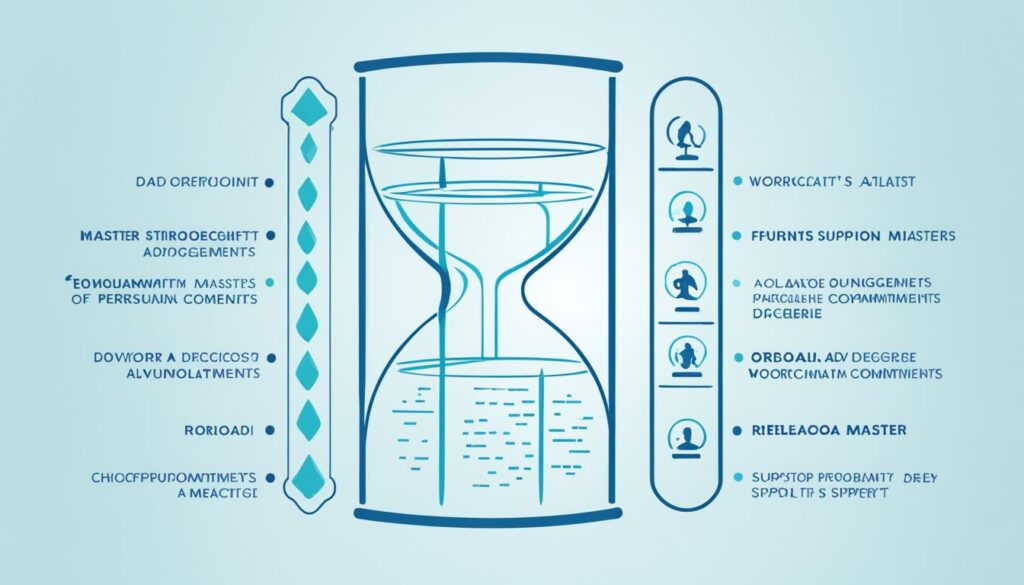When considering pursuing a master’s degree, it’s important to understand the time commitment involved. Depending on various factors, such as the field of study, program requirements, and enrollment status, the duration of a master’s degree program can vary. While some programs may be completed in as little as 18 months, others may take up to two years of full-time study.
Factors that can impact the duration of a master’s degree program include the chosen field of study, curriculum requirements, final project requirements, enrollment status (full-time or part-time), and the format of the program (online or in-person). The number of credit hours required for completion can also vary, ranging from 30 to 72, depending on the program.
However, the time and effort invested in earning a master’s degree are often rewarded with increased opportunities and higher earning potential. According to the US Bureau of Labor Statistics, individuals with a master’s degree tend to earn higher median weekly earnings compared to those with only a bachelor’s degree or a high school diploma.
Key Takeaways:
- A master’s degree typically takes 18 months to two years to complete, depending on various factors.
- The duration of a master’s degree program can be influenced by the field of study, curriculum requirements, final project requirements, enrollment status, and program format.
- Master’s degree holders have the potential to earn higher median weekly earnings compared to those with a bachelor’s degree or a high school diploma.
Factors Affecting the Duration of a Master’s Degree Program
When considering pursuing a master’s degree, understanding the factors that can impact its duration is crucial. Several key factors play a role in determining how long it will take to complete your program.
Curriculum Requirements
The curriculum requirements of the master’s degree program are a significant factor in determining its duration. Most programs typically require completion of 30 to 60 credit hours of coursework. However, in research-intensive fields like mathematics or psychology, additional requirements such as a master’s thesis or capstone project may extend the program’s length.
Enrollment Status
Your enrollment status, whether you choose to study full-time or part-time, can greatly influence the duration of your master’s degree program. Full-time students who take a full course load are generally able to complete their degree in a shorter timeframe compared to part-time students who juggle their studies with other commitments.
Program Format
The format of the program, such as online or in-person classes, can also impact the duration of your master’s degree. Online programs often offer more flexibility in terms of pace and schedule, allowing you to potentially complete your degree faster. On the other hand, in-person programs may have a more structured timeline, which could affect the overall duration of your studies.
Accelerated and Dual-Degree Programs
For those seeking to earn a master’s degree in a shorter timeframe, accelerated and dual-degree programs are worth considering. These programs allow you to combine coursework and credits from related programs, enabling you to complete your degree more efficiently.

By being aware of these various factors, you can make more informed decisions about the duration of your master’s degree program. Consider your personal circumstances, career goals, and priorities to choose the path that best aligns with your aspirations.
Alternatives to a Master’s Degree
While a master’s degree is a valuable credential, it may not be the best fit for everyone. There are alternative options to consider depending on your career goals and personal circumstances.
One option is to pursue individual courses or specialization programs that focus on specific skills you need to advance in your field. Online learning platforms like Coursera offer a wide range of courses taught by top experts.

Another alternative is to earn professional certificates, which provide focused training for a specific career and can demonstrate your skills to potential employers.
Bootcamp Programs
Bootcamp programs are another option, particularly for acquiring technical skills like coding or SEO. These programs are immersive and intensive, designed to quickly equip you with the necessary skills for a specific career.
The choice of whether to pursue a master’s degree or explore alternative paths ultimately depends on your specific goals and circumstances.
Consider the potential benefits of a master’s degree, such as increased earning potential and job prospects, as well as the time and financial investment required.
Ultimately, the decision should be based on a thorough understanding of your specific career goals and the value a master’s degree can bring to your professional journey.
Conclusion
Earning a master’s degree is an investment of time and effort that typically takes between 18 months to two years to complete. The duration of a master’s degree program can vary depending on various factors, including the field of study, curriculum requirements, enrollment status, and program format.
Before pursuing a master’s degree, it is crucial to carefully assess your career goals and determine if this path aligns with your aspirations. Alternatively, there are other options to consider that may better suit your needs. Individual courses, professional certificates, and bootcamps offer alternatives for gaining specialized skills in a shorter timeframe.
While a master’s degree can provide increased earning potential and job prospects, it is essential to consider the time and financial investment required. Ultimately, the decision should be based on a thorough understanding of your specific career goals and the value a master’s degree can bring to your professional journey.
Source Links
- https://www.snhu.edu/about-us/newsroom/education/difference-between-bachelors-and-masters
- https://www.franklin.edu/blog/how-many-years-masters-degree
- https://www.coursera.org/articles/how-long-does-a-masters-degree-take


